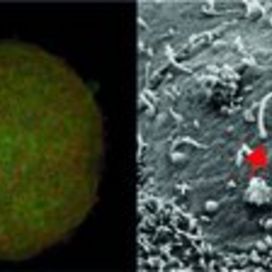
Neuherberg, 20.12.2019
By the might of a lash against bad blood sugar levels
If the cilia on the pancreatic beta cells do not function properly, glucose intolerance and type 2 diabetes develop. In Nature Communications, a research team from Helmholtz Zentrum München now described the underlying mechanisms. The team found that the hair-like structures regulate insulin secretion into the pancreas using direct cell-cell communication pathways. The researchers hope that these findings will provide them with a long-term therapeutic target for both ciliopathies and diabetes.
more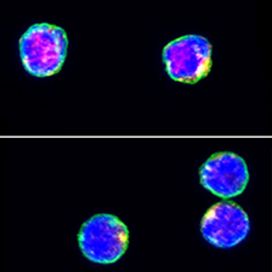
Neuherberg, 18.12.2019
Type 1 Diabetes: Researchers Identify New Molecular Target to Prevent Progression of Islet Autoimmunity
Regulatory T cells (Tregs)* prevent excessive immune reactions in healthy people. In the development of autoimmune type 1 diabetes, this protection is not sufficiently effective. Researchers at Helmholtz Zentrum München and LMU Munich have now deciphered a mechanism that impairs Treg differentiation and stability. In the study, when they inhibited the molecule that triggers this mechanism, an increased number of functional Tregs were formed again and autoimmune activation was reduced. This may represent a new molecular target to delay or even prevent the development of type 1 diabetes. The study was carried out within the framework of the German Center for Diabetes Research (DZD), and the results have now been published in 'Nature Communications'.
morePotsdam-Rehbrücke, 10.12.2019
Metabolic Benefit of Insoluble Cereal Fiber
Insoluble cereal fiber has a beneficial effect! However, this effect is not the same for every person. As an international research team led by DZD scientist Dr. Stefan Kabisch of DIfE showed in the journal 'Nutrients', it is important to analyze the metabolic state of a patient more precisely in order to give optimal dietary recommendations. A diet adapted to the individual could be particularly useful for the prevention of type 2 diabetes, but also for other diseases.
morePotsdam-Rehbrücke, 30.11.2019
Lipid Metabolism and Diabetes: In Sync with the Internal Circadian Clock
Depending on the timing of food intake, plasma lipid profiles change and affect insulin sensitivity. This is shown in a study by a research group led by PD Dr. Olga Ramich of DIfE and DZD, which has now been published in the 'Journal of Clinical Endocrinology & Metabolism'.
more
Potsdam-Rehbrücke, 25.11.2019
Leibniz Association Senate Recommends Further Funding for DIfE
Following a positive evaluation, the Leibniz Association Senate recommends further funding for DIfE by the federal and state governments. On November 26th, the Leibniz Association Senate issued its statement regarding the regular scientific evaluation of the German Institute of Human Nutrition Potsdam-Rehbrücke (DIfE). In this statement, the Senate approves the recommendations of the evaluation group and recommends further funding for DIfE by the federal and state governments for the next seven years. The evaluation group attests the scientific work on average as “very good”. This represents a promising and sustainable basis for future developments of the institute. "The evaluation result is a great success. We are very pleased and would like to thank all our employees for their outstanding scientific and science-supporting work, which has now also been officially recognized," said Professor Tilman Grune, scientific director, and Dr. Birgit Schröder-Smeibidl, administrative director of DIfE.
more
Potsdam-Rehbrücke, 21.11.2019
Diabetology: Deficits in the Promotion of Young Talents – Increasing Demands
Diabetology faces major challenges due to a decrease in the number of chairs in diabetology and increasing numbers of people with diabetes. Professor Annette Schürmann and Dr. Thomas Laeger from the DZD partner DIfE, together with colleagues from Aachen and Freiburg, highlight this situation in the recently published German Health Report Diabetes 2020 (from page 231). They also point out why this shortage has occurred and illuminate what is being done to rekindle interest in diabetology among young doctors and aspiring researchers and secure patient care.
more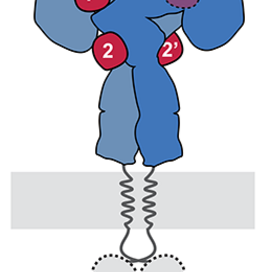
Dresden, 15.11.2019
Researchers discover a new way in which insulin interacts with its receptor
Since the discovery of insulin nearly 100 years ago, scientists have explored how it interacts with its receptor with the goal of improving the ability of therapeutic insulins to mimic the way insulin works in the body. In a new study, researchers have solved a critical piece of the puzzle by showing how insulin interacts with its receptor at a second binding site. The team of scientists from the Paul Langerhans Institute Dresden (a satellite of Helmholtz Zentrum München and a partner of the German Center for Diabetes Research) and the Faculty of Medicine Carl Gustav Carus at TU Dresden in Germany, together with colleagues from the Max Planck Institute of Biochemistry in Munich, Germany, McGill University in Canada, and the University of Helsinki in Finland will publish their results in the 'Journal of Cell Biology' (JCB).
more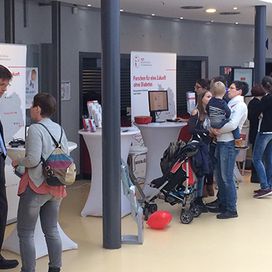
Neuherberg, 08.11.2019
DZD at World Diabetes Day: Risk Test, Interactive Games and Valuable Information from Diabetes Research
November 14 is World Diabetes Day. Numerous activities will take place around this date in order to draw attention to the metabolic disease and its consequences. The German Center for Diabetes Research (DZD) is involved in various activities. At World Diabetes Experience Day on November 16th at Potsdamer Platz in Berlin, the DZD will be present with the test for the German Diabetes Risk Score, an interactive quiz, up-to-date information from diabetes experts and much more. The DZD is also supporting phone campaigns and the dialogue campaign on type 1 diabetes.
more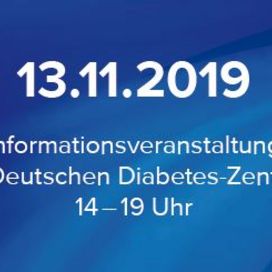
Düsseldorf, 07.11.2019
Early Detection of Diabetes: Information Event at the German Diabetes Center (DDZ) in Conjunction with World Diabetes Day 2019
Do you know if your family members have risk factors for diabetes? How can diabetes be prevented and detected early? What can you do if you or a family member is newly diagnosed with diabetes? On Wednesday, November 13, 2019, a varied program awaits you at the 5th Patient Day at the German Diabetes Center (Auf'm Hennekamp 65, 40225 Düsseldorf), from 2:00 pm to 7:00 pm. Test your diabetes risk, have your eyes checked for possible diabetes-related changes and listen to talks to learn more about secondary diseases, latest developments in treatment and research. Take the initiative and get informed in the run-up to World Diabetes Day!
more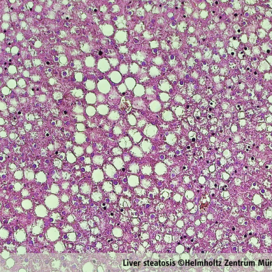
Neuherberg, 06.11.2019
What and how much we eat might change our internal clocks and hormone responses
For the first time, a study led by researchers at Helmholtz Zentrum München and the German Center for Diabetes Research (DZD) shows how glucocorticoid hormones, such as cortisol, control sugar and fat levels differently during day and night, feeding and fasting, rest and activity, over the course of 24 hours. The research conducted in mice found that the time-of-day dependent metabolic cycle is altered by high caloric diet. Since glucocorticoids are widely used drugs for the treatment of inflammatory diseases, these findings published in Molecular Cell suggest that lean and obese patients might respond differently to steroid therapy. Finally, it reveals the biological function of daily rhythms of hormone secretion (high before awakening and feeding, low when sleeping and fasting) as well as daily cycles of sugar and fat storage or release by the liver.
more
Düsseldorf, 06.11.2019
Active Throughout Life: Fun Exercise with PFIFF
Regular exercise can be so easy. In order to give children a further incentive for an active lifestyle, the SMS initiative has now developed the active card game "Fun Exercise with PFIFF" together with Borussia Düsseldorf and the Präha Weber School.
more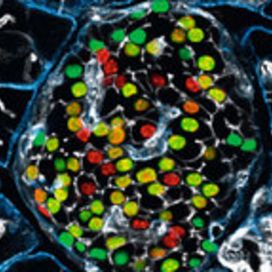
Neuherberg, 25.10.2019
Helmholtz Zentrum München allies with Eli Lilly and Company to discover new targets for pancreatic beta cell regeneration in the treatment of diabetes
The Institute of Diabetes and Regeneration Research at Helmholtz Zentrum München and the global pharmaceutical company Eli Lilly and Company (Lilly) have entered a new strategic research collaboration in the field of pancreatic beta cell regeneration. The joint goal is to improve and accelerate treatment of diabetes mellitus.
more
Munich, 15.10.2019
Study on early detection of type 1 diabetes reaches milestone and continues
The Institute of Diabetes Research of the Helmholtz Zentrum München has now registered 100,000 participants in the Bavarian study "Fr1da" on the early detection of type 1 diabetes. The study will be continued with an additional age group under the name "Fr1da-plus": in addition to 2 to 5-year-olds, 9 and 10-year-old children can now also participate in the study.
more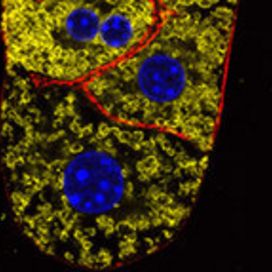
Munich, 14.10.2019
Discovery of Potential Novel Therapeutic Target for Non-Alcoholic Fatty Liver Disease
One of the key comorbidities of type-2-diabetes is non-alcoholic fatty liver disease (NAFLD). With an increasing prevalence worldwide and no treatment options available today, NAFLD paves the way to more severe liver damage such as cirrhosis and hepatocellular carcinoma. A group of researchers including the Institute for Diabetes and Cancer at Helmholtz Zentrum München has discovered a potential novel therapeutic target for treating NAFLD: Rab24. The paper was published in 'Nature Metabolism'.
more
Düsseldorf, 22.08.2019
Type 2 Diabetes Prevention: Can Diabetes Risk Be Lowered by Consuming Whole Grain Products?
Numerous studies have shown that dietary behavior plays a role in the prevention of type 2 diabetes. In an umbrella review, scientists at the German Diabetes Center (DDZ) have systematically analyzed and evaluated the validity of studies on dietary factors and diabetes. High evidence for a reduced risk of diabetes could be demonstrated for a high intake of whole grain products (especially cereal fibers) and lower consumption of sugar-sweetened beverages and red meat (especially processed meats and bacon). The results were published in the 'British Medical Journal'.
more
Potsdam-Rehbrücke, 09.08.2019
Fresh Off the Press: DIfE Biennial Report in Magazine Look
With new sections, bright colors and a lively layout, the just published Biennial Report 2017/2018 of the German Institute of Human Nutrition Potsdam-Rehbrücke (DIfE) features a modern magazine look. "The mix of complex scientific content, soft facts and attractive design aims to appeal to both experts and non-specialists and thus make the multifaceted work of the Institute accessible to as broad a public as possible," said Professor Tilman Grune, scientific director of DIfE.
more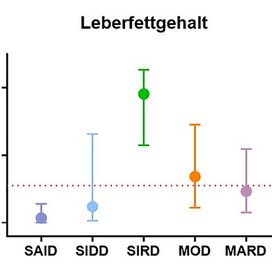
Düsseldorf, 06.08.2019
A New Diabetes Classification? Subgroups of Type 2 Diabetes have Specific Risk of Diabetes-Associated Diseases such as Fatty Liver and Neuropathy
Recent studies provide evidence for an updated diabetes classification reflecting different risks for diabetes-related complications. Researchers at the German Diabetes Center (DDZ) and their partners from the German Center for Diabetes Research (DZD) and the University of Lund in Sweden have now identified clusters allowing for the separation of different diabetes subtypes. Two of these subtypes are at higher risk of fatty liver disease and diabetic neuropathy early on after the diagnosis of diabetes. In line with the concept of precision medicine, these findings illustrate the need for targeted diagnosis and treatment for these patients’ subgroups in order to delay or even prevent diabetes-related complications.
more
Düsseldorf, 24.07.2019
Preventing Obesity in Childhood and Adolescence: Prize for the "FreizeitFit4Kids" Prevention Program of RIN Diabetes
As part of the "FreizeitFit4Kids" project, RIN Diabetes of the German Diabetes Center (DDZ) together with the Düsseldorf Youth Welfare Office is promoting the prevention of obesity and diabetes in childhood and adolescence in the setting "open child and youth work". This has now been accepted as an exemplary project and member of the initiative "Healthy North Rhine-Westphalia" of the Ministry of Labor, Health and Social Affairs of North Rhine-Westphalia.
more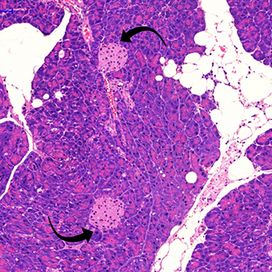
Potsdam-Rehbrücke, 03.07.2019
Promising Approach: Prevent Diabetes with Intermittent Fasting
Intermittent fasting is known to improve sensitivity to the blood glucose-lowering hormone insulin and to protect against fatty liver. DZD scientists from DIfE have now discovered that mice on an intermittent fasting regimen also exhibited lower pancreatic fat. In their current study published in the journal 'Metabolism', the researchers showed the mechanism by which pancreatic fat could contribute to the development of type 2 diabetes.
more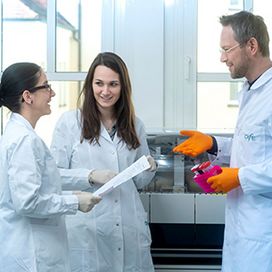
Potsdam-Rehbrücke, 25.06.2019
Skipping Meat on Occasion May Protect Against Type 2 Diabetes
People who eat less live longer and healthier lives – many studies point out the positive effect of (intermittent) fasting. However, besides calorie reduction, the quantitative relationship of the individual food components also plays an important role. Scientists at DIfE, a partner of the German Center for Diabetes Research, have now demonstrated in the animal model that the sole restriction of the amino acid methionine prevents the onset of type 2 diabetes. Their results were published in the 'FASEB Journal'.
moreNeuherberg, 24.06.2019
10 Years DZD: Working to Achieve Precise Treatment and Prevention Strategies for Diabetes
The DZD was founded ten years ago, on June 24, 2009, upon the initiative of the German Federal Ministry of Education and Research. More than 400 experts from various disciplines, including basic researchers, epidemiologists, health care researchers and clinicians, are working together to improve the prevention and treatment of diabetes and to avoid secondary diseases. One goal is to develop precise preventive and therapeutic measures; i.e. the right treatment for the right group of patients at the right time. Here the DZD has already reached the first important milestones.
more
Düsseldorf, 05.06.2019
The DDZ Opens New Center of Competence for Innovative Diabetes Therapy (KomIT) Comprised of Eight Partners
In a festive ceremony, the German Diabetes Center (DDZ) officially opened its new Competence Center for Innovative Diabetes Therapy (KomIT), a consortium of eight partners. The consortium from industry and university research aims to advance the development of new therapies for diabetes. The objective of the Center, coordinated by the DDZ, is the efficient translation of innovative research results into clinical applications to improve patients’ diabetes management. The project will receive funding from the state of North Rhine-Westphalia and the EU amounting to around 3.5 million euros over the next three years.
more
Berlin, 31.05.2019
DZD Researchers Honored at the 2019 Diabetes Congress
The German Diabetes Society (DDG) honors several researchers of the German Center for Diabetes Research (DZD) at its congress in Berlin (May 28th to June 1st). Prof. Dr. med. Dr. h.c. Matthias Tschöp will receive the Paul Langerhans Medal, the highest award of the DDG.
more
Neuherberg, 31.05.2019
Matthias Tschöp receives the highest honor from the German Diabetes Association
The 2019 Paul Langerhans Medal goes to Prof. Dr. med. Dr. h.c. Matthias Tschöp. The German Diabetes Association (DDG) is thereby paying tribute to Tschöp’s contributions to research in the field of diabetes and to the development of new drug candidates for the treatment of type 2 diabetes. The Langerhans Medal is the highest award conferred by the German Diabetes Association. Named after the physician Paul Langerhans, the medal has been awarded to leading international researchers in diabetology for over 40 years.
more
Düsseldorf, 30.05.2019
Professor Christian Herder Receives Menarini Project Grant 2019
At the Diabetes Congress held this year in Berlin, the German Diabetes Association awarded Professor Christian Herder of the German Diabetes Center (DDZ) the Menarini Project Grant. Herder, head of the "Inflammation" research group at the Institute for Clinical Diabetology (DDZ) and scientist at the Department of Endocrinology and Diabetology (Faculty of Medicine, Heinrich Heine University Düsseldorf) received the award for his project "Prevalence, Determinants and Risk Factors of Sarcopenia in Patients with Recently Diagnosed Type 1 Diabetes and Type 2 Diabetes".
more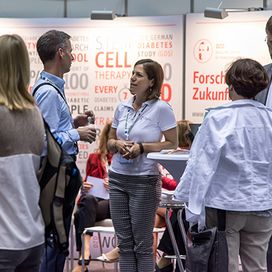
Neuherberg, 27.05.2019
Innovative Diabetes Research for Future Care
Currently, about seven million people in Germany suffer from diabetes. The incidence is rising rapidly: By 2040, the number of people with diabetes is projected to increase to 12 million (1). But how can the metabolic disease be treated or even prevented? Specialists from various disciplines work together at the DZD to develop tailor-made approaches for the prevention, diagnosis and treatment of diabetes and thus combat the widespread disease. In various symposia at the Diabetes Congress (May 29 - June 1, 2019, Berlin), DZD researchers will present current highlights of their work.
more
Düsseldorf, 21.05.2019
Diabetes Congress 2019: “Diabetes – Not Only a Question of Type”
Under the motto "Diabetes – Not Only a Question of Type", the latest developments in diabetes research and treatment will be discussed at the Diabetes Congress 2019, which will take place from May 29th to June 1st, 2019 in Berlin. Each year, the Diabetes Congress attracts around 7,000 physicians working in hospitals or medical practices as well as researchers, health professionals and other interested persons. The congress president of this year's annual meeting of the German Diabetes Society (DDG) – the Diabetes Congress 2019 – is Professor Michael Roden, chairman of the board and scientific director of the German Diabetes Center (DDZ).
more
Düsseldorf, 16.05.2019
Football Training with a Focus on Kinesiology
The participating children of the SMS initiative completed a training session with the football trainer and former professional player Efthimios Kompodietas.
more
Wiesbaden, 02.05.2019
Personalized prevention of diabetes – relevance of subgroups
Statement at the DGIM press conference, May 6, 2019 The number of people in Germany diagnosed with diabetes is increasing. Currently about 7 million people suffer from diabetes, and by 2040, the number of people with type 2 diabetes is projected to increase up to twelve million. [1]. The number of excess deaths associated with diabetes is high, one in five individuals in Germany dies of diabetes [2]. These statistics highlight the urgent need for new, effective prevention measures and innovative forms of treatment.
more
Wiesbaden, 30.04.2019
DZG at DGIM: Research for People's Health
A focus of this year's 125th Annual Meeting of the German Society of Internal Medicine (DGIM) on May 4-7 in Wiesbaden will be on the German Centers for Health Research (DZG). In scientific symposia and at the joint stand, the DZG centers will present their current research results.
more
Düsseldorf, 26.03.2019
Moving More Together
The children of the SMS initiative train at the Düsseldorf Sports Club 1899.
more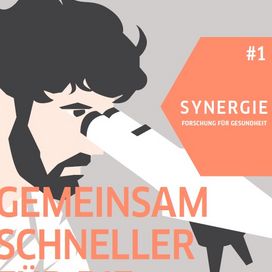
Neuherberg, 26.03.2019
"Our medicine is research"
The aim of SYNERGIE, the new magazine published jointly by the German Centers of Health Research (DZG,) is to present modern medical research and provide a brief digest of the latest research findings. SYNERGIE seeks to show how interdisciplinary and networked research can help people attain better health.
more
Düsseldorf, 21.03.2019
The Basics for a Balanced Diet
The children taking part in the SMS initiative completed their nutrition pilot license on the occasion of March 7, 2019, Healthy Nutrition Day.
more
Dresden, 12.03.2019
New Shotgun Lipidomics Method for Molecular Profiling of Adipose Tissue
The Paul Langerhans Institute Dresden, a partner of the DZD, and the University Hospital Carl Gustav Carus joined their forces with Lipotype GmbH and developed a new shotgun lipidomics method for the molecular profiling of brown and white adipose tissue. The results of this collaborative work have now been published in the journal 'Molecular Metabolism'.
more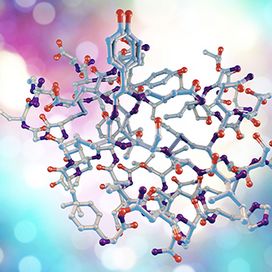
Potsdam-Rehbrücke, 11.03.2019
Insulin: Protective Adaptive Mechanism in the Brain
Insulin helps neurons produce a specific class of proteins that are important for brain health. This is the result of a study in mice by DZD scientists at DIfE published in the journal 'Molecular Metabolism': Animals administered the hormone through the nose expressed more of the protective proteins and ate less high-fat chow than mice that did not receive intranasal insulin.
more
Düsseldorf, 27.02.2019
Inspiring Children: Cooking with PFIFF
As part of the initiative “SMS. Be smart. Join in. Be fit.”, elementary schoolchildren learn that a balanced diet is a key prerequisite for the prevention of lifestyle-related diseases such as obesity and type 2 diabetes. The SMS initiative has just published a kids’ cookbook with many different recipe ideas from children, sponsors of the initiative and competitive athletes.
more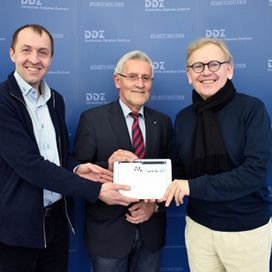
Düsseldorf, 19.02.2019
New Competence Center for Innovative Diabetes Therapy (KomIT) Funded by NRW and EU
Over the next three years, a new competence center will be established at the German Diabetes Center (DDZ) with funds from the state of North Rhine-Westphalia and the EU amounting to around 3.5 million euros. The new competence center is to be set up in cooperation with a consortium of eight partners from industry and university research to promote the targeted development of new therapies for diabetes. The aim of the center coordinated by the DDZ is the efficient translation of innovative research results into clinical applications to improve patients’ diabetes management.
more
Düsseldorf, 05.02.2019
A Fun Approach to a Healthy Lifestyle
At PreSchoolSports, the children participating in the initiative “SMS. Be smart. Join in. Be fit.” can try out a wide range of sports activities.
more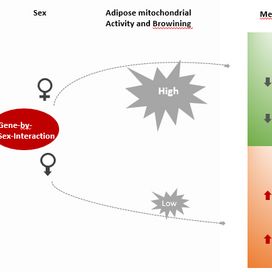
Neuherberg, 14.02.2019
The Lypla1 Gene Impacts Obesity in a Sex-Specific Manner
Susceptibility to obesity, insulin resistance and other cardio-metabolic traits may also be dependent on a person’s sex. An international research team of the University of California (UCLA), Helmholtz Zentrum München, a partner of the DZD, and Ludwig-Maximilians-Universität München studied sex differences and sex-specific interaction with the genetic background in cardio-metabolic phenotypes. The researchers discovered, among other things, a sex-specific obesity locus of the Lypla1 gene, which is associated with human obesity. The results of the study have now been published in Cell Metabolism.
more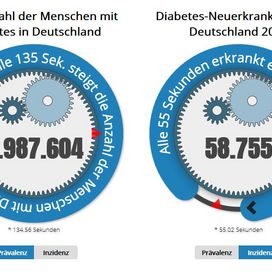
Düsseldorf, 07.02.2019
Number of People with Type 2 Diabetes Projected to Increase to 12 Million in Germany by 2040
Currently, depending on the respective estimate, at least 7.2 percent of the population in Germany have diabetes, most of them type 2 diabetes. The number of people with diabetes will increase significantly in the next two decades. Scientists at the German Diabetes Center (DDZ) in Düsseldorf and the Robert Koch Institute (RKI) in Berlin predict that in 20 years up to 12 million people in Germany could have type 2 diabetes. This would correspond to an increase of up to 77 percent between 2015 and 2040.
more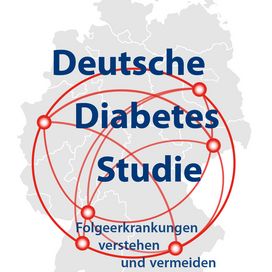
Düsseldorf, 06.02.2019
Genetic Variant Associated with Improved Glycemic Response to Metformin
Many individuals with type 2 diabetes take the diabetes drug metformin to improve their blood glucose levels. A team of scientists at the DZD partner German Diabetes Center (DDZ) has discovered that metformin is associated with a greater decrease in blood glucose levels in individuals recently diagnosed with type 2 diabetes who carry a specific variant of the glucose transporter (GLUT2) gene than in individuals without this variant.
more
Düsseldorf, 06.02.2019
Active Start to a Healthy Life
Düsseldorf's largest sports club, the SFD '75, supports the initiative "SMS. Be smart. Join in. Be fit" in the fight against lifestyle-related diseases such as overweight and type 2 diabetes.
more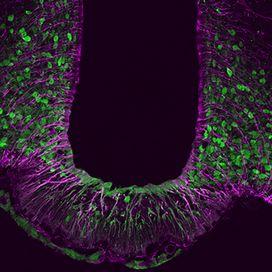
Neuherberg, 31.01.2019
Identity crisis of satiety neurons leads to obesity
Obesity − as research in the past decade has shown − is first and foremost a brain disease. Researchers at Helmholtz Zentrum München, partners in the German Center for Diabetes Research, have now discovered a molecular switch that controls the function of satiety neurons and therefore body weight. The findings were published in the journal ‘Nature Metabolism’.
more
Düsseldorf, 30.01.2019
Diabetes Guide for the Düsseldorf Region: Up-to-Date Information
It is often not easy for people with diabetes to find information about relevant offerings and services in their vicinity. The Regional Innovation Network (RIN) Diabetes aims to close this gap and offers people with diabetes, family members, and other interested individuals a diabetes guide. This free information brochure gives the target group a quick and easy overview of offerings, contacts and addresses in the greater Düsseldorf area. In addition to the brochure, RIN Diabetes also provides an online version (www.rin-diabetes.de/wegweiser).
more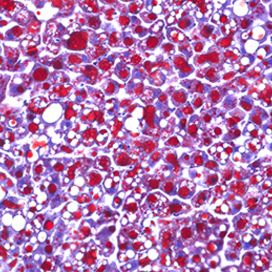
Neuherberg, 25.01.2019
Helmholtz scientists identify the causes of cortisone induced side effects
Patients undergoing long-term treatment with steroids may suffer from metabolic side effects. Researchers at the Helmholtz Zentrum München and the Ludwig Maximilians University of Munich (LMU), partners in the German Center for Diabetes Research (DZD), have now pinpointed a mechanism that leads to so-called steroid diabetes. Their findings have been published in ‘Nature Communications’.
moreMedia Library
Press contact

Birgit Niesing
niesing(at)dzd-ev.de
+49 (0)89 3187-3971
